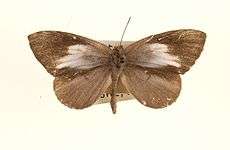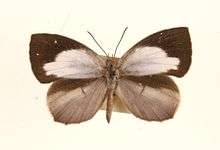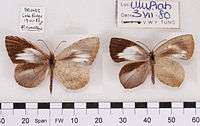Miletus symethus
Miletus symethus, the great brownie,[1][2] is a small butterfly found in India[3][4] that belongs to the lycaenids or blues family. The species was first described by Pieter Cramer in 1777.

| Great brownie | |
|---|---|
 | |
| Female from Malaya | |
| Scientific classification | |
| Kingdom: | |
| Phylum: | |
| Class: | |
| Order: | |
| Family: | |
| Genus: | |
| Species: | M. symethus |
| Binomial name | |
| Miletus symethus (Cramer, 1777) | |
| Synonyms | |
| |
Range
It is found in the Naga Hills in India, Myanmar,[3][4] Malaya, Sumatra and the Philippines.
Description
A small butterfly, 40 to 50 mm in wingspan, it is the largest of the genus. The upper forewing in both sexes has a broad white discal band which extends right up to dorsum, the upper edge of which is sharply angled at vein 3. The upper hindwing has a pale discal streak.[4]
Technical description
The male has the upperside of wings dusky brownish black. The ground colour of the forewings darker, almost pure black in fresh specimens, on the apical third of the wing; a short streak in the middle of interspace 1, a more outwardly produced similar streak in interspace 2, basal halves of interspaces 3 and 4, the lower apex of the discoidal cell and the extreme base of interspace 5, white, all forming a median conspicuous irregular white patch on the wing, narrowly traversed by the veins which are greyish brown. Hindwing: more uniform, slightly darker on its anterior half. Underside: light brown with an ochraceous tint. Forewing: the median white patch as on the upperside but larger, its margins less clearly defined, continued posteriorly to the dorsal margin; obscure catenulated (in the form of a chain), incomplete, transverse, white-margined narrow bands, two at base and two or three very short ones above the white median patch on the costal area, from between the outer two of these latter a transverse, zigzag, very slender, somewhat obscure white line crosses the anterior portion of the wing to vein 4; lastly a pre-tornal quadrate brown spot near apex of interspace 1a and an obscure sub-terminal transverse series of slightly lunular small brown spots; the ground colour terminally paler and more ochraceous than on the inner portions of the wing. Hindwing: crossed by very obscure sinuous brown and white slender lines, that on the costal area form very short, obsolescent, catenulated narrow brown bands; a subterminal series of brown slender lunules, sometimes obsolete. Antennae, head, thorax and abdomen brown; beneath: paler, the palpi and thorax more or less white.
The female has the upperside forewings of dark brown; base shaded with greyish brown; the white median patch as in the male, but very much larger, its upper margin irregularly curved; it is spread over the anterior two-thirds of the cell, extends beyond it into the bases of interspaces 4, 5 and 6, and below the cell it occupies the basal four-fifths of interspaces 1 and 2. Hindwing: costal margin broadly dark brownish; wing posteriorly from below the subcostal vein and vein 6a beautiful pale bluish-grey; a broad whitish streak beyond the cell not reaching the termen. Underside, forewing: the median white patch as on the upperside but larger, extending to the dorsal margin and base of cell; base of wing, costal margin above the sub-costal vein and conjoined upper discal obliquely-placed patch greyish brown; apex of wing whitish, termen between veins 1 and 6 broadly stained with rusty; a conspicuous rusty pretornal spot; some obscure white-margined spots at base of cell and along costa, and a transverse sub-terminal series of black dots. Hindwing: pale ochraceous white, darkening to rusty brown towards the middle of the termen; a subbasal, a median and a discal transverse incomplete macular brown band, each spot in the bands margined on the inner and outer sides by slender black lines; finally a subterminal transverse series of short slender black threads. Antenna, head, thorax and abdomen as in the male.[5]
Subspecies

- M. s. symethus (Java)
- M. s. acampsis (Fruhstorfer, 1913) (northern Sumatra)
- M. s. atimonicus Murayama & Okamura, 1973
- M. s. batuensis (Fruhstorfer, 1914) (Batu Islands)
- M. s. edonus (Fruhstorfer, 1913) (Philippines: Palawan)
- M. s. hierophantes (Fruhstorfer, 1915) (northern Borneo, Sulu Islands)
- M. s. nuctus Eliot, 1961 (Sumatra)
- M. s. perlucidus (Fruhstorfer, 1913) (Bali, Lombok, eastern Java)
- M. s. petronius (Distant & Pryer, 1887) (Burma, Thailand, Langkawi, Malay Peninsula, Singapore, Borneo, Bangka, Natuna, Belitung, Karimata)
- M. s. phantus Eliot, 1986 (Philippines: Marinduque, Luzon)
- M. s. philopator (Fruhstorfer, 1914) (Philippines)
- M. s. solitarius Okubo, 1983 (Tioman)
- M. s. vespasianus (Fruhstorfer, 1913) (Nias)
Cited references
- Savela, Markku (28 September 2016). "Miletus symethus (Cramer, [1777])". Lepidoptera and Some Other Life Forms. Retrieved 14 January 2020.
- Beccaloni, G.; Scoble, M.; Kitching, I.; Simonsen, T.; Robinson, G.; Pitkin, B.; Hine, A.; Lyal, C., eds. (2003). "Miletus symethus". The Global Lepidoptera Names Index. Natural History Museum. Retrieved 21 April 2018.
- Evans, W. H. (1932). The Identification of Indian Butterflies (2nd ed.). Mumbai, India: Bombay Natural History Society. p. 211, ser no H5.6.
- Wynter-Blyth, Mark Alexander (1957). Butterflies of the Indian Region. Bombay, India: Bombay Natural History Society. p. 254. ISBN 978-8170192329.
- Bingham, C. T. (1907). The Fauna of British India, Including Ceylon and Burma: Butterflies Volume II. London: Taylor and Francis, Ltd.
References
| Wikimedia Commons has media related to Miletus symethus. |
| Wikispecies has information related to Miletus symethus |
- Evans, W. H. (1932). The Identification of Indian Butterflies (2nd ed.). Mumbai, India: Bombay Natural History Society.
- Wynter-Blyth, Mark Alexander (1957). Butterflies of the Indian Region. Bombay, India: Bombay Natural History Society. ISBN 978-8170192329.
External links
- Takanami, Yusuke & Seki, Yasuo (2001). "Genus Miletus". A Synonymic List of Lycaenidae from the Philippines. Archived from the original on 30 June 2001 – via Internet Archive. With images.